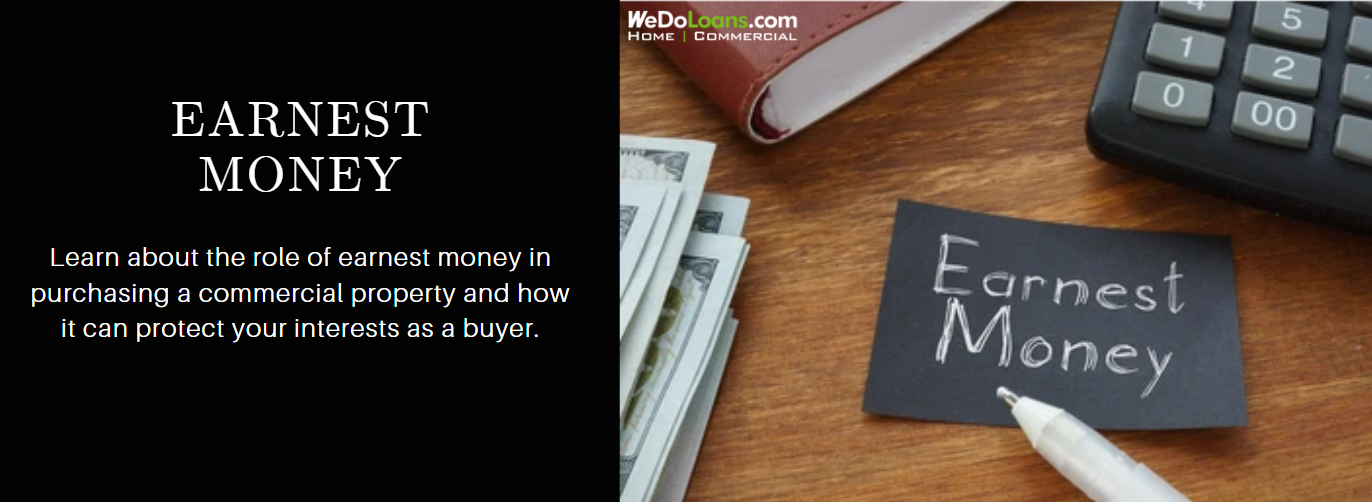
While not mandatory in commercial property transactions, earnest money is commonly included in most agreements. Here’s an overview of earnest money: its definition, negotiation aspects, and its potential refundability.
What Is Earnest Money?
Earnest money is a deposit provided by the buyer of commercial real estate to the seller, demonstrating serious intent to purchase the property. It serves to assure the seller of the buyer’s commitment to the deal. Without earnest money, sellers might lack confidence that buyers won’t withdraw from the agreed transaction.
How Does Earnest Money Work in Commercial Real Estate?
During the negotiation phase of a real estate deal, earnest money is typically agreed upon. Details, including the amount, are finalized upon signing the purchase contract. The buyer submits this deposit shortly after contract signing, often within the next business day.
Instead of going directly to the seller, the earnest money deposit is held in an escrow account managed by a neutral third party, such as a title company or bank. This arrangement ensures that the seller cannot access the funds until the deal concludes.
The terms of the purchase agreement outline specific deadlines that the buyer must meet, such as obtaining financing, conducting inspections, and completing appraisals. These deadlines are meant to ensure the buyer fulfills their obligations diligently.
Earnest money is released upon the successful completion of the transaction or if the deal falls through. The escrow holder disburses the funds according to the terms of the contract and the circumstances of the transaction.
What Amount of Earnest Money Can You Expect?
In commercial real estate, earnest money typically amounts to around 1% of the purchase price. This often results in deposits ranging from $5,000 to $10,000 for properties valued between $500,000 and $1 million. However, amounts can vary significantly based on market conditions, property size, and location.
High-demand properties in competitive markets might require deposits of 5% to 10%, or even up to 15% of the purchase price. Conversely, less desirable properties in slow markets may accept deposits lower than 1%.
Negotiating Earnest Money: Tips
Since earnest money deposits are negotiable, buyers and sellers should be prepared to discuss this aspect of the transaction. Consider the following tips to negotiate earnest money deposits in commercial real estate:
- Market Conditions: Highlight factors that affect property desirability, such as local market trends, property condition, and unique features.
- Contingencies: The presence and terms of contingencies can impact earnest money negotiations. Removing contingencies can reduce the risk for sellers, potentially leading to a smaller earnest money deposit. Conversely, adding contingencies may necessitate a larger deposit to reassure sellers.
Is Commercial Earnest Money Refundable?
The refundability of earnest money in commercial real estate hinges on the specifics outlined in the purchase contract and the circumstances surrounding the transaction’s progress.
Who Retains Earnest Money if the Deal Fails?
Earnest money is typically non-refundable if the buyer is responsible for the deal’s failure, especially due to failure to secure financing within the agreed timeline.
Conversely, if the seller withdraws from the deal after contract signing, the earnest money deposit is generally refunded to the buyer.
In some cases, purchase contracts may include provisions that allow earnest money to be refunded even if the buyer fails to secure financing on time. Such conditions are less common but can be negotiated based on market conditions and property specifics.
Should disputes arise during inspections or appraisals, efforts are usually made to resolve these to keep the transaction moving forward. However, if an agreement cannot be reached, the outcome for the earnest money deposit depends on the nature of the issue and the contract terms.
Conclusion
Before entering into a commercial real estate purchase, be prepared to negotiate earnest money terms. Understanding its purpose and potential refundability will help ensure that the agreement meets your expectations and needs.
